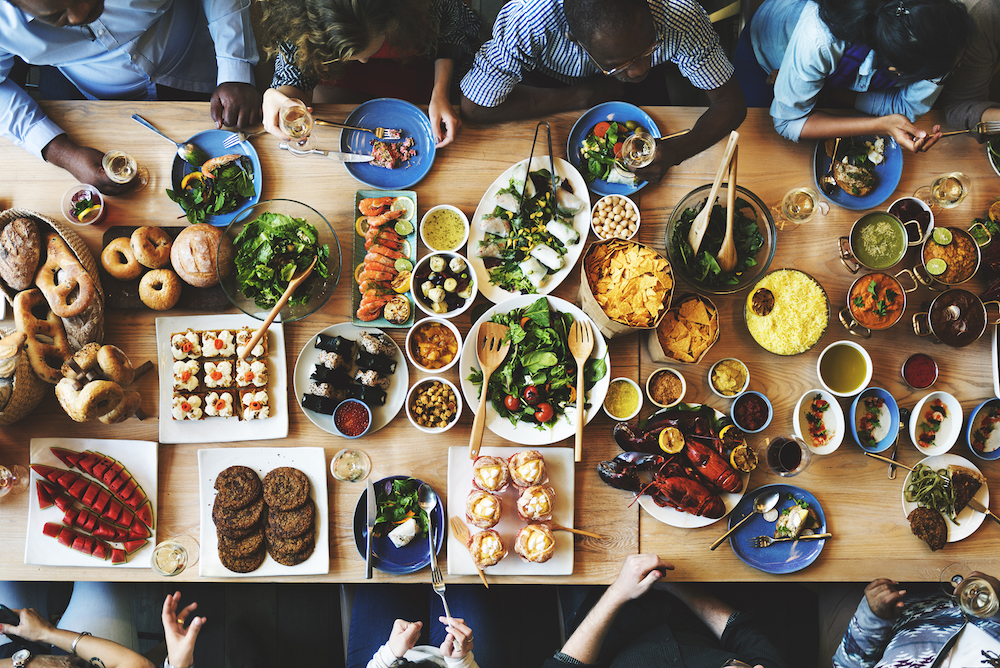How to avoid weight gain during the holidays:
• Step-up the volume of exercise you are getting.
• Enjoy special holiday foods in moderation and pass on everyday foods like crackers and dip.
• Before going to a party, eat a small portion of something healthy at home first. This will help curb your appetite, and you’ll be less tempted to over-indulge on calorie-rich foods at the party.
• Avoid skipping meals. Starving yourself before a party or get-together increases the odds that you’ll overeat once you get there.
• Head for the table with the non-alcoholic drinks. Alcohol can stimulate your appetite. It also contains a lot of “empty” calories and lowers your good intentions.
• Skip high-calorie beverages such as sodas, juices, smoothies, and blended coffee drinks.
• Eat more of the smoked or roasted turkey and less of the stuffing, gravy and pie.
• If the holiday party is at your house, send the leftovers home with your guests.
• Nibble. Eating slowly helps you eat less and still feel satisfied.
• Avoid foods high in saturated fat. Look for fruit, vegetables, yogurt dip or salsa instead.
• Don’t stand next to the buffet table. Get what you want, then move on.
“Fighting the temptation of holiday food is really tough for everyone, myself included,” says Karla Luna, Clinical Dietitian, Baylor Scott & White Medical Center – Round Rock. “But for people with special health problems, such as diabetes, it can be especially difficult. Diabetes is usually treated by diet, exercise, and medication, but the hectic pace of the holidays, along with an abundance of rich foods, can interfere with healthy routines,” adds Luna.
It’s also essential for people with diabetes to take their medications, such as insulin, and to be careful that the timing of meals stays consistent to avoid low blood sugar. Ideally, people with diabetes should already be following an individualized meal plan developed by a dietician, and should have their blood sugar under control before the holidays begin. Luna says moderation is the key. For someone with diabetes, one or two cookies or a sliver of pumpkin pie can be incorporated into a meal plan as a treat.
“Fighting the temptation of holiday food is really tough for everyone, myself included” -Karla Luna, Clinical Dietitian, Baylor Scott & White Medical Center – Round Rock
Before sitting down to a holiday meal, people with diabetes should have in their mind what they’re going to eat. They should not skip meals because they think they’re going to eat more later, or go more than four hours without eating. For those who do overindulge at a holiday meal, you can get back on track at the very next meal by following the meal plan.
Our consumption of food nearly triples during the holiday season, and those suffering from allergies to foods need to be extra careful. With the scrumptious variety of foods available during the holidays, a food allergy can easily present itself.
If you have food allergies, the following tips will help you enjoy safe eating during the holidays:
• Always read labels. Ingredients can change unexpectedly from one month to the next. If the food or candy does not have an ingredient list, do not eat it.
• Remind family members and friends that strict avoidance is key when managing food allergies and even one bite can cause problems.
• Nuts or peanuts are used in many foods, including cereals, candies and cookies. Some commercially prepared apple pies also contain nuts.
• When dining out, ask about the ingredients used in preparing the dish before tasting the food.
• Remember that the more common food allergens such as egg, milk, shellfish, peanuts, soy, and wheat are often hidden as ingredients in casseroles or desserts.
• Be aware of what you are eating, but don’t limit your diet to only a few foods since a well-balanced nutrition regimen is best.
• If you have had severe reactions to a food, talk to your doctor about carrying an epinephrine injector (epi- pen).
• If you experience symptoms, avoid any further contact with that food, rinse your mouth and see a doctor immediately.
For more information visit www.sw.org.







Recent Comments